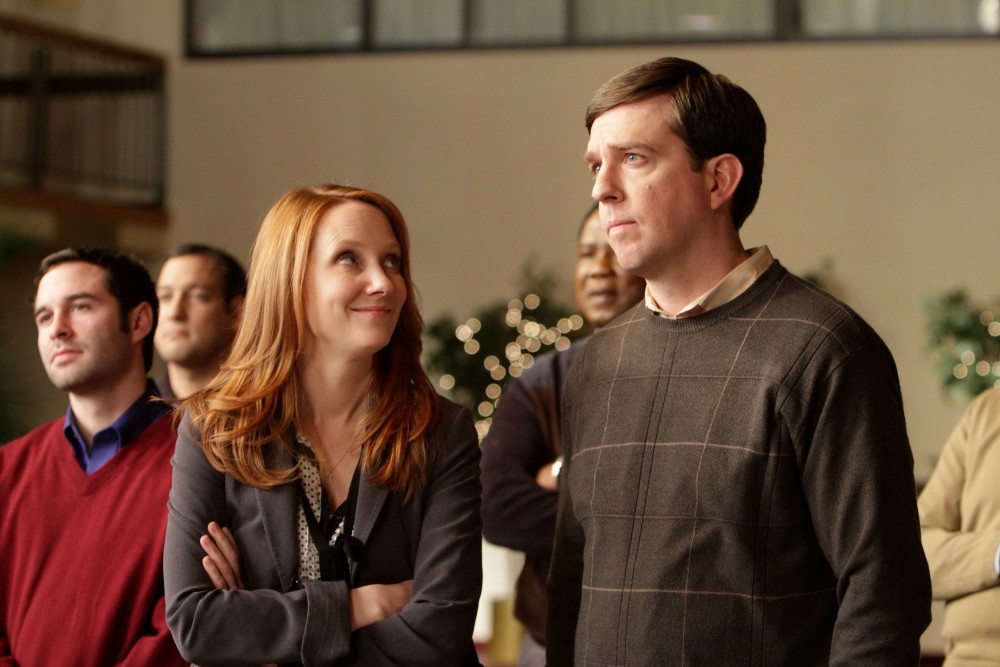âÄúCedar RapidsâÄù
Directed by: Miguel Arteta
Starring: Ed Helms, John C. Reilly, Anne Heche
Rated: R
Showing at: Area theaters
The Great Middle West has long been the subject of mockery for the suits in Hollywood, with our elongated vowels, modest values and flannelled wardrobes rising above any other perceivable stereotypes to code our people as cute backwoods simpletons. Ya, sure, itâÄôs a harmless ribbing. But for Jim Burke and Phil Johnston, two of the men behind Fox SearchlightâÄôs âÄúCedar Rapids,âÄù the Midwest can be funny without being looked down upon.
Burke graduated from the University of Minnesota in 1982 and shortly thereafter made his way to Los Angeles in an old Ford Pinto. With the ambition to create what he calls âÄúhuman movies,âÄù Burke became a producer, eventually teaming with Alexander Payne and Jim Taylor to form Ad Hominem Enterprises. When the production team came across JohnstonâÄôs script, Burke knew heâÄôd found something special âÄî a story that was comedic yet rooted in true Midwestern sensibility.
âÄúI read the script and I was knocked out,âÄù Burke said. âÄúI knew that he had an original voice and one that reflected what itâÄôs like to be from [the Midwest].âÄù
Johnston, like Burke, is a Midwest native, born in Minnesota and raised in Neenah, Wisc. He attended the University of Minnesota for a year and later worked as a KARE 11 reporter before heading to film school a decade ago. His âÄúCedar RapidsâÄù script was listed at No. 5 on HollywoodâÄôs 2009 Black List of the most-liked unproduced screenplays, a somewhat double-edged honor.
âÄúThe way the industry works just isnâÄôt how most people think,âÄù Johnston said. âÄúStudios buy hundreds of scripts. IâÄôve made a wonderful, fine living in the last five years getting paid to write stuff that no one has ever seen, and thatâÄôs just the way it goes.âÄù
But âÄúCedar Rapids,âÄù unlike JohnstonâÄôs other shelved projects, has actually made it to the big screen.
The movie follows Tim Lippe, an innocent insurance salesman (Ed Helms) who, in light of his star coworkerâÄôs death, must head to the âÄúbig cityâÄù to attend an insurance convention. There, in Cedar Rapids, Iowa, Lippe brushes with booze, prostitution and corruption, and while his naïveté is a source of humor, itâÄôs never at the expense of the characterâÄôs overall dignity.
âÄúThe details of the place and the people who live [in the Midwest] âÄî I just wanted it to feel real and for them to be real people and never to mock it,âÄù Johnston said.
To fully actualize JohnstonâÄôs reverence for the motherland and its inhabitants, the producers hired Miguel Arteta, an indie director known for his delicate handling of characterization.
âÄúEven though [ArtetaâÄôs] not from [the Midwest], I knew he possessed that one thing that we really wanted: He treated the characters in his movies with tenderness,âÄù Burke said. âÄúHe wasnâÄôt making fun of anybody, and we didnâÄôt want that to happen in this movie âĦ We didnâÄôt want anybody to think that we were superior or laughing at them.âÄù
The filmâÄôs success lies partly in ArtetaâÄôs direction and partly in the script, but it also owes largely to a cast that includes John C. Reilly, Stephen Root, Anne Heche and Sigourney Weaver. But the filmâÄôs lynchpin is Ed Helms, who walks the fine line between noble innocence and absurd arrested development, and never once falters.
WhatâÄôs more, âÄúCedar RapidsâÄù manages the difficult feat of misdirection, shifting our initial perceptions regarding the characters, the setting and even the insurance business.
âÄúItâÄôs a subversive film in a way,âÄù Burke said. âÄúAll the powerful people are kind of exposed to be what they really are, and the people that on face value seem to be people you donâÄôt want to be associated with âÄî those are the people that are [TimâÄôs] true friends.âÄù
In many ways, the reversals found in âÄúCedar RapidsâÄù mirror those of the coastal viewer. As the veil of simplistic living and wholesome family values is lifted from TimâÄôs eyes, so too is it lifted from the eyes of an audience entangled in HollywoodâÄôs one-dimensional treatment of the Midwest. TimâÄôs revelation âÄî the viewerâÄôs revelation âÄî is not one bound by notions of morality, but rather by the commonality of the American experience.








